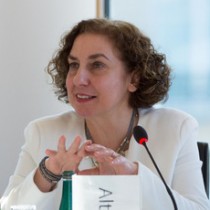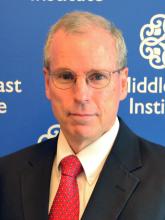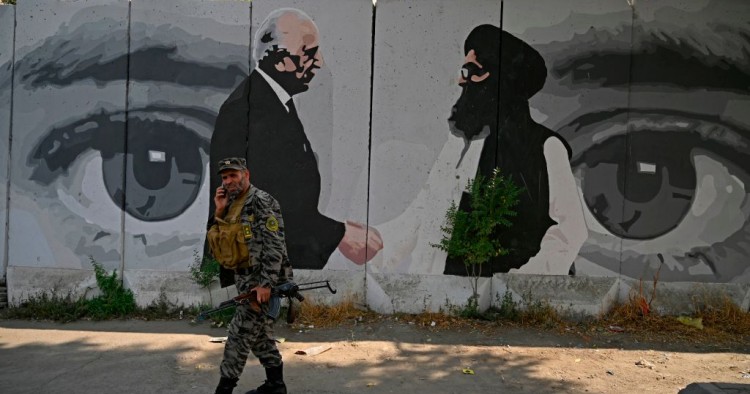This week's briefing on recent news and upcoming events in the region featuring Marvin G. Weinbaum, Meliha Benli Altunışık, and Robert S. Ford.
Bumps on the way to Afghan peace talks
Marvin G. Weinbaum
Director for Afghanistan and Pakistan Studies

Just when the remaining obstacles to intra-Afghan talks in Doha seemed cleared away, there was another hiccup in the peace process. A government delegation expected to leave late last week has delayed its departure, supposedly for “technical reasons” but likely because of disagreements among its members. Meanwhile, the Taliban has suddenly replaced the leader of its negotiating team. The opening of talks is nevertheless believed to be finally at hand — albeit six months after they were supposed to begin — with completion of a disputed prisoner exchange. Once again bending to Taliban demands, the Kabul government has released the last of 400 requested government-held prisoners, mostly hardened terrorists and criminals. President Ashraf Ghani had held back on freeing seven of them after France and Australia objected to releasing men accused of killing their nationals. But Ghani then found a face-saving way out by offering to send the seven to Qatar to be placed under “temporary” house arrest.
Also included among the last batch of freed prisoners were some charged with the death of Americans. Yet the Trump administration, once sensitive to the killing of even a single U.S. combatant, issued no complaint. To the contrary, U.S. officials, including Secretary of State Mike Pompeo, leaned heavily on Kabul to complete a prisoner release agreed to in the U.S.’s February deal with the Taliban. Getting the intra-Afghan negotiations underway is thought necessary to validate the U.S.’s decision to undertake its troop withdrawal. A determination that nothing be allowed to upset the American exit plans is further demonstrated by the U.S.’s willingness to ignore a key provision of the February agreement — that the Taliban break its ties to al-Qaeda.
Once the two large delegations finally sit down to talk, a government push for a “humanitarian cease-fire” and discussions over a framework for a reconfigured Afghan state are expected to top the agenda. Progress has long been thought to require agreement on some form of power sharing. But the talks may have been jeopardized even before they begin by President Ghani’s public declaration last week that peace does not require reaching a political deal on power sharing. In somewhat opaque language, Ghani warned the Taliban not to expect negotiations to enable it to replace the current republic. The president is trying to assure the many Afghans uneasy with the possibility that the Taliban may achieve political dominance through diplomacy. He is also letting it be known that he has no intention of stepping down in favor of an interim government.
Turkey and Greece at conflict in the eastern Mediterranean
Meliha Benli Altunışık
Non-resident Scholar

The problems between Turkey and Greece are historical. However, the maritime limitation dispute in the eastern Mediterranean is a new addition to the list of problems between the two countries. The current crisis, like many others before it, emerged mainly due to a unique opportunity structure. The two sides have their reasons that contribute to the divergences, and these are related both to the issue at hand as well as domestic politics. In addition, the shifts in the international system characterized by, among other things, U.S. President Donald Trump’s “America First” policies and Brexit have created incentives for actors both within and outside the eastern Mediterranean region to prop up their positions.
The crux of the crisis is related to the issue of maritime delimitation in the eastern Mediterranean. This came to fore following the discovery of natural gas by Greek Cypriots and Israel and their cooperation with Greece to form the East-Med Gas Pipeline, a project to bring Israeli and Greek Cypriot gas to Greece via an undersea pipeline. This project would exclude Turkey and was made possible by Greece’s decision to assign the island of Kastellorizo full exclusive economic zone rights, citing the U.N. Convention on the Law of the Sea. Turkey, for its part, rejects the Greek claim as it would effectively cut its own maritime jurisdiction in half, limiting it to 41,000 sq km. Although international law as a general principle accepts that islands may have full maritime rights, especially island states, it also reiterates that maritime zones should be decided through negotiation between the relevant parties, taking into consideration special circumstances and the principle of equity. Turkey argues that Kastellorizo, which is located just 2 km from Turkey’s mainland and 570 km from Greece's and is home to fewer than 500 people, should be treated as an exception under international law, like several examples from other parts of the world.
Instead of trying to reach a negotiated solution, however, so far both sides have engaged in tit-for-tat and military escalation. In Greece, the Mitsotakis government, unable to address the severe economic crisis at home, seems to be using this dispute with Turkey to shore up nationalist sentiment. Similarly, in Turkey, the issue has consolidated and expanded the nationalist bloc President Recep Tayyip Erdogan has created. The Greek government also seems to think that it has the stronger hand as in recent years Turkey has become increasingly isolated in the region and to some extent in Europe. One of the problems in this crisis is that unlike the many earlier examples, there are outside powers on the side of Greece that seem to see this as an opportunity to expand their influence and/or limit Turkey's. Yet, at the end of the day, it should be Turkey and Greece as two neighbors that should find a solution to this conflict. Thus, both sides should put aside their maximalist claims and sit at the table and start negotiating. After all, this is when the maximalist positions can be seen as achieving a result.
Tunisia: A new government for now
Robert S. Ford
Senior Fellow

Last Thursday Prime Minister Hichem Mechichi’s new cabinet took office after winning a confidence vote in the Parliament. Mechichi seeks to address the economic crisis urgently, beginning with calming labor unrest in key industrial sectors. He met on Friday with the Tunisian labor confederation and a major industry and trade association. The coronavirus pandemic has aggravated Tunisia’s economic problems, and by the second quarter of 2020 GDP had fallen 21 percent from the level of the previous year. The government will restart talks with the IMF for financial support. Meanwhile, Mechichi has also pledged to prioritize reform of government administration and protecting low-income households as unemployment has risen to 18 percent. A terrorist attack last Sunday that killed a national guardsman in the touristic city of Sousse underlined the country’s challenges.
Tunisian analysts question whether this cabinet, the second in six months, will long enjoy political support. In the end Mechichi needed backing from the Islamist factions in the Parliament to win the confidence vote. The Islamists and their parliamentary allies preferred to approve this cabinet rather than vote it down and then see President Kais Saied call new elections. President Saied appeared suspicious of Mechichi’s winning Islamist support, and the new cabinet may not have strong backing from liberal blocs in Parliament and the presidency. Mechichi would be in a fragile position if he has to depend on the Islamists and their allies; they helped eject his predecessor, whom they also had initially supported. Moreover, when they approved Mechichi’s cabinet last week the Islamist factions in Parliament warned they would move to change some of its members, notably the interior and justice ministers. Mechichi and his team will need a deft political touch to move ahead.
Photo by WAKIL KOHSAR/AFP via Getty Images
The Middle East Institute (MEI) is an independent, non-partisan, non-for-profit, educational organization. It does not engage in advocacy and its scholars’ opinions are their own. MEI welcomes financial donations, but retains sole editorial control over its work and its publications reflect only the authors’ views. For a listing of MEI donors, please click here.













